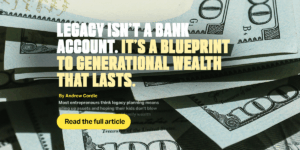Here’s something that’ll make you rethink your retirement planning: You can now die with $30 million in assets and Uncle Sam won’t touch a penny of it.
I remember the first time someone explained estate taxes to me. I was sitting in a lawyer’s office, trying to figure out how to protect the little bit of wealth I’d managed to scrape together. This guy starts talking about death taxes and exemption limits, and I’m thinking, “Motherfucker, I’m worried about having enough money to retire, and you’re talking about what happens when I’m dead?”
But then he drops this bomb: “Andrew, if you die with more than $12 million, the government takes 40% of everything above that threshold.”
I said, “Well, that’s not going to be a problem for me. I didn’t grow up on the right side of money, remember?”
“Yeah, but what if you build something bigger than you think? What if your business takes off? What if real estate goes crazy? You’d be surprised how fast wealth can accumulate when you’re not paying attention.”
That conversation changed everything for me. Because here’s the thing—estate taxes aren’t just for trust fund babies and tech billionaires. They’re for anyone who builds something valuable and wants to pass it on to their kids instead of handing it to the government.
And Trump’s Big Beautiful Bill just moved the goalpost in a big way. The estate tax exemption jumped from about $14 million to $30 million for married couples. That means you and your spouse can now die with $30 million in assets—businesses, real estate, investments, whatever—and your kids get it all without paying a dime in federal estate taxes.
Let me break this down like you’re my neighbor, not some trust fund attorney:
The estate tax is basically a penalty for being successful. When you die, if your total net worth exceeds a certain threshold, the government swoops in and takes up to 40% of everything above that line. It’s like a final “screw you” for having the audacity to build wealth.
But here’s what most people don’t understand—this isn’t just about billionaires. This is about family farms that have been passed down for generations. This is about small businesses that employ dozens of people. This is about real estate portfolios that took a lifetime to build.
Under the old rules, if you died with $20 million in assets, your kids would owe the IRS about $2.4 million just for the privilege of inheriting what you built. Under the new rules? They owe nothing.
How many of you have been stressing about estate planning because you were worried about crossing that threshold? How many of you have been structuring your wealth in complicated ways just to avoid estate taxes?
You see what I mean? This isn’t just about saving money on taxes—this is about the fundamental question of whether you get to decide what happens to your life’s work or whether the government gets to take a chunk of it.
Think of it like this: You spend 40 years building a business, accumulating real estate, investing wisely. You’ve already paid income taxes, capital gains taxes, property taxes—you’ve paid taxes on the same money multiple times. The estate tax is the government saying,
“You know what? We want one more bite of the apple before your kids get what’s left.”
The math ain’t mathin’ if you’re still structuring your wealth around outdated estate tax limits.
But here’s what separates the smart money from everyone else—they understand this change isn’t just about avoiding taxes. It’s about creating generational wealth without government interference.
My buddy owns a chain of auto repair shops. Good business, solid cash flow, but under the old rules, he was looking at a massive estate tax bill that would have forced his kids to sell half the business just to pay Uncle Sam. Now? His kids can inherit the whole operation and keep it in the family.
This isn’t just about money, though. This is about preserving family legacies. It’s about keeping family farms in families instead of forcing them to sell to corporate agriculture. It’s about letting small business owners pass their life’s work to their children instead of the IRS.
I’m not doing this for applause, but I’ve seen too many families get destroyed by estate taxes. Good people who worked their asses off to build something meaningful, only to watch the government take a huge chunk of it when they die. It’s like being punished for success.
Money is a game, but estate planning shouldn’t feel like Russian roulette with the IRS.
You build wealth, you structure it intelligently, you plan for the future, and you multiply what matters most—your family’s financial security and your ability to leave a legacy that lasts.
So here’s my challenge: Stop thinking like someone who’s grateful for whatever the government lets your family keep. Start thinking like someone who understands that wealth preservation is just as important as wealth creation.
The shoebox mentality says “work hard and hope there’s something left for the kids.” The $30 million exemption mentality says “build generational wealth and pass it on intact.”
Which legacy are you going to leave?






